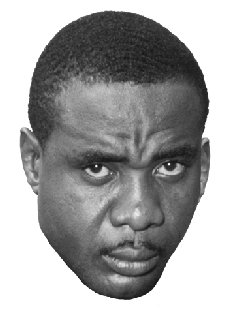





























Charles L. "Sonny" Liston (unknown
- December 30, 1970) was an American professional boxer known for
his toughness, punching power and intimidating appearance. A long
avoided contender, he became world heavyweight champion in 1962 by
knocking out Floyd Patterson in the first round, repeating the knockout
in a defense of the title. Although widely regarded as unbeatable,
Liston lost the title in 1964 to 7-1 underdog Muhammad Ali. Controversy
followed with claims he had been drinking heavily the night
before the fight. In the rematch Liston suffered a shocking first
round knockout that led to unresolved suspicions of a fix. He was
still a world ranked boxer when he died in mysterious circumstances.
Underworld connections - along with his unrecorded date of birth -
added to the enigma. The Ring magazine ranked Liston as the seventh
greatest heavyweight of all time.
Early life
Charles "Sonny" Liston
was born into a sharecropping family who farmed the poor land of Morledge
Plantation near Johnson Township, St. Francis County, Arkansas. His
father, Tobe Liston, was in his mid 40s when he and his wife, Helen
Baskin, who was nearly 30 years younger than Tobe, moved to Arkansas
from Mississippi in 1916. Helen had one child before she married Tobe,
and Tobe had 13 children with his first wife. Tobe and Helen had 12
children together. Sonny was the second youngest child.
Date
of birth
There is no record of Liston's birth, though in the 1940 census
he was listed as a 10 year old boy. It has been suggested Liston may
not have know what year he was born, as he was not precise on the
matter. He finally settles on a date of birth of May 8, 1932 for official
purposes but by the time he won the world title an aged appearance
added credence to rumors that he was several years older that he was
by then claiming.
Youth
Tobe Liston inflicted whippings so severe
on Sonny that the scars were still visible decades later. "The only
thing my old man ever gave me was a beating," Liston said. Helen Baskin
moved to St. Louis, Missouri, with some of her children, leaving Liston
- aged around 13, according to his later reckoning - in Arkansas with
his father. Sonny thrashed the pecans from his brother in law's tree
and sold them in Forrest City. With the proceeds he traveled to St.
Louis and reunited with his mother and sibling. Liston tried going
to school but quickly left after jeers about his illiteracy; the only
employment he could obtain was sporadic and exploitative.
Liston
turned to crime and led a gang of toughs who committed muggings and
armed robberies. He became known to the St. Louis police as the "Yellow
Shirt Bandit", due to the shirt he wore during robberies. Liston was
caught in January 1950. He gave his age as 20, while the St. Louis
Globe-Democrat reported that he was 22. Liston was convicted and sentenced
to five years in Missouri State Penitentiary. His time in prison started
on June 1, 1950.
Liston never complained about prison, saying
he was guaranteed three meals every day. The athletic director at
Missouri State Penitentiary, Rev. Alois Stevens, suggested to Liston
that he try boxing, and his obvious aptitude, along with an endorsement
from Stevens, who was also a priest, aided Liston in getting an early
parole. Stevens organized a sparring session with a professional heavyweight
named Thurman Wilson to showcase Liston's potential. After two rounds,
Wilson had taken enough. "Better get me out of this ring, he is going
to kill me!" he exclaimed.
Amateur boxing career
After he was released from prison on October 31, 1952, Liston had a brief amateur career which spanned less than a year. Liston captured the Chicago Golden gloves Tournament of Champions on March 6, 1953, with a victory over 1952 Olympic Heavyweight Champion Ed Sanders. He then outpointed Julius Griffin, winner of the New York Golden Gloves Tournament of Champions, to capture the Intercity Golden gloves Championship on March 26. Liston was dropped in the first round, but he came back to control the next two rounds and had Griffin hanging on at the end.
